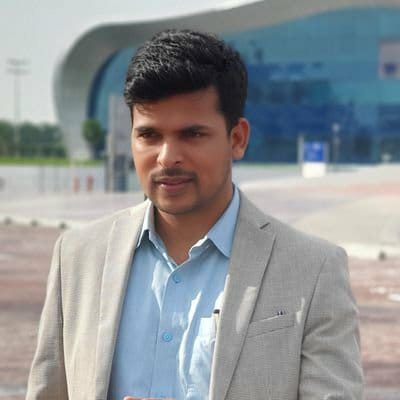Somesh Upadhyay (32) is an Indian Administrative Officer (IAS) who bagged an All India Rank of 34 in the 2016 examination. This officer is known for his rather unique teaching methods for UPSC aspirants.
Currently posted as Sub-Divisional Magistrate, Titilagarh, Odisha, he manages to find time from his busy schedule to mentor and help aspiring Union Public Service Commission (UPSC) candidates qualify for the Civil Service Examination (CSE).
Hailing from Bihar, Somesh spent a majority of his childhood in Kolkata. An excellent student right through his school days, Somesh says he wanted to become a scientist. He studied in an English medium school in Howrah until class 5, post which he had to move to a school that imparted education in Bengali.
A topper in the class 10 board examination, Somesh went on to complete his class 12 at the Ramakrishna Mission in Jharkhand.
While pursuing a Masters degree at Tata Institute of Fundamental Research, he decided to work in public administration and connect with the people in a direct manner. “With certain financial constraints cropping up in the family, staying in Delhi, attending coaching classes and preparing was not an option,” he tells The Better India.
In 2015, Somesh moved to Varanasi where he continued to prepare for the UPSC examination. “It was while preparing for the exam that I realised how inadequate the resources available to me were. I struggled quite a bit because of the lack of guidance and it was to change this that I started finding ways to mentor and coach UPSC aspirants,” he says.
After clearing the UPSC examination, Somesh has helped other aspirants too. He maintains a blog where he periodically writes about techniques to follow during preparation and has a WhatsApp Telegram channel where he conducts mini test series and clears doubts as well. A total of seven aspirants, who were part of the Telegram group, qualified for the mains and Somesh decided to mentor them.
The WhatsApp Coach

“The idea of starting the Whatsapp group was to provide individual attention to the seven aspirants who qualified for the mains. I started off with giving them one question a week to work on,” he says, adding that these aspirants needed a little additional help and support. “There is no doubt that they were all very well qualified,” he adds.
Somesh would then go through their responses and help them frame better answers. He says, “Sometimes aspirants would miss out on small points like starting with a good introduction or even ending the essay well. In my coaching, I helped them fine tune their answers.” Somesh focussed on the nitty gritties of improving the writing skills of each aspirant he mentored.
Out of the seven aspirants, three have qualified for the services and are now preparing for their interviews. Somesh is now running an interview mentorship programme and also conducting mock interviews to boost their self-confidence. He holds one mock interview a week until the final interview date. “The idea behind this WhatsApp coaching was to help aspirants tide through the pandemic situation without having to enrol in expensive coaching classes,” says Somesh.
Making accessibility fashionable
Somesh has never shied away from sharing his contact details with aspirants. He says that he has had many aspirants reach out to him directly and since he is not able to always answer them immediately, he started leveraging social media. “As a routine, I share one question every week with the aspirants. I also set a time limit by when the aspirants should send in their answers,” he says. Somesh is meticulous in giving them feedback and urges them to work on their responses.
“Along with this, I also conduct video calls periodically in which we discuss the basics of main preparation and answer writing skills,” he says. From time management to writing answers succinctly within the word limit, the WhatsApp group helps with all this and more. “To correct the small mistakes that UPSC aspirants tend to make is what I focus on with this group,” he adds.
Tips for other aspirants
Learn to be clear in your writing
Somesh says that aspirants must work on delivering excellent answers. He says, “It is important that aspirants convey everything that they wish to in a concise and clear manner. The examiner should not reach out for a dictionary to understand the meaning of the words used by the aspirants. Use vocabulary that is easy to follow.”
Focus only on the operative part
“Always frame your answers in such a way that it conveys the message as soon as the examiner begins to read your answer. Do not waste time in establishing the non-operative part of the answer,” says Somesh, adding that one should learn to convey the message in the best possible manner and in the given word limit. He also urges aspirants to look at questions with an analytical mind.
If you would like to follow Somesh’s blog, click here and to follow him on Twitter, click here.
(Edited by Yoshita Rao)
No comments:
Post a Comment